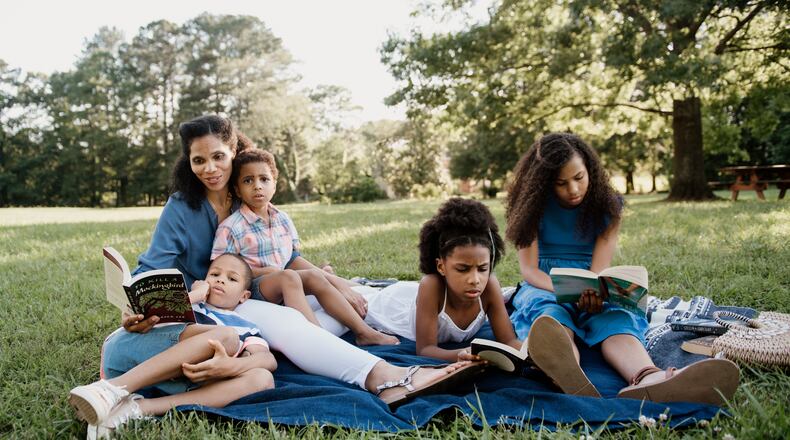The longtime public school educators in Amber O’Neal Johnston’s family tolerated her decision to home-school her oldest child through pre-K and kindergarten. But when the Cobb mother didn’t enroll her daughter in first grade, her aghast family asked, “What are you really doing?”
Their skepticism didn’t surprise Johnston. When her husband, Scott, first suggested that she home-school their precocious 4-year-old, Johnston burst out laughing.
“We were both products of public education. I didn’t even think home-schooling was an option. It was something white people do,” said Johnston, 44, an Illinois native and a self-described overachiever with an MBA. She moved to Atlanta in 2006 to work for Georgia-Pacific and developed her own concierge fitness and dietitian service on the side.
Seldom daunted by a challenge, Johnston took on home-schooling their daughter. Today, she is an influential home-schooler with a vast social media following. Johnston runs Heritage Homeschoolers, a support group in Cobb of 100 Black families with 300 children. Her Heritage Mom website and Instagram draw a national customer base for her literature-rich curricula. Her first book, “A Place to Belong: Celebrating Diversity and Kinship in the Home and Beyond,” publishes in May. She continues to home-school her four children, ages 12, 10, 8 and 6.
U.S. census data shows home-schooling rose during the pandemic, most notably among Black households. From spring 2020 to this past fall, home-schooling Black families increased from 3.3% to 16.1%. (Those rates are expected to fall with the resumption of in-person classes.)
As a home-schooling mother of color, Johnston found few role models. Home-schooling in the South has been dominated by white Christian conservatives. Common home-school textbooks contend slaveholders treated enslaved people well and describe the Ku Klux Klan as a group seeking to prevent anarchy.
Credit: Courtesy photo
Credit: Courtesy photo
Johnston’s home-schooling chronicles led to questions: “Why do your kids only read books about Black people? Isn’t that just as bad as white kids never reading about other people?”
Johnston’s answer summarizes the philosophy that has made her a sought-after speaker: Children need windows to see others, but also mirrors to see themselves. She chooses books absent from most home-school curricula, books that allow her Black children to be seen, reflect the storytelling of their culture, fill in the blanks of the Black history she herself never learned in school, and capture Black joy.
“In the beginning, I was focused on the magic of childhood and having a slow childhood with lots of time in nature, great books, leaning into our community. I wasn’t looking at my child as a Black child; she was just my child,” said Johnston.
But Johnston was jolted when her older daughter began to lament her skin color and hair. “She wanted to have yellow hair. She was hiding her Black baby dolls in the back of the closet. She only wanted to play with her pretty white dolls,” said Johnston.
Since she was her daughter’s primary teacher, Johnston anguished over the source of these negative messages. Her daughter told her: “You say we study important things in school and we only study white people.”
“My first thought was that my husband and I were raised this way, we’re fine.” But then Johnston realized, “I am really not fine, but I learned how to wear the mask in school. I blew up our school and started over.”
Now, she teaches about Rembrandt but also about Black artists Horace Pippin and Henry Ossawa Tanner. “I saw my daughter come alive and I never looked back,” she said.
Johnston and her children are looking ahead to a planned three-month stay in Ghana this fall. Before COVID-19, she and her children made similar educational excursions to Peru, Bolivia, Greece and France. They stay in one place, live cheaply without a rental car and dig deep into the local culture and lifestyle.
Such trips benefit from Johnston’s formidable organizing talents, evidenced by the 18 events on the February calendar for her Cobb home-schooling group, including a field trip to see the Obama portraits at the High Museum of Art. She’s already creating lesson plans for next year.
“I haven’t watched a TV show in 10 years,” she said. “I have a high level of planning, but we are highly flexible. It has never ever happened that we fully execute everything on our weekly schedule.”
That flexibility allows her children to plot and follow their own paths.
“I create a place for them to belong,” said Johnston. “They are not me. They have never received grades or report cards. They don’t have any of those external blue ribbons. I love that for them.”
About the Author
The Latest
Featured




